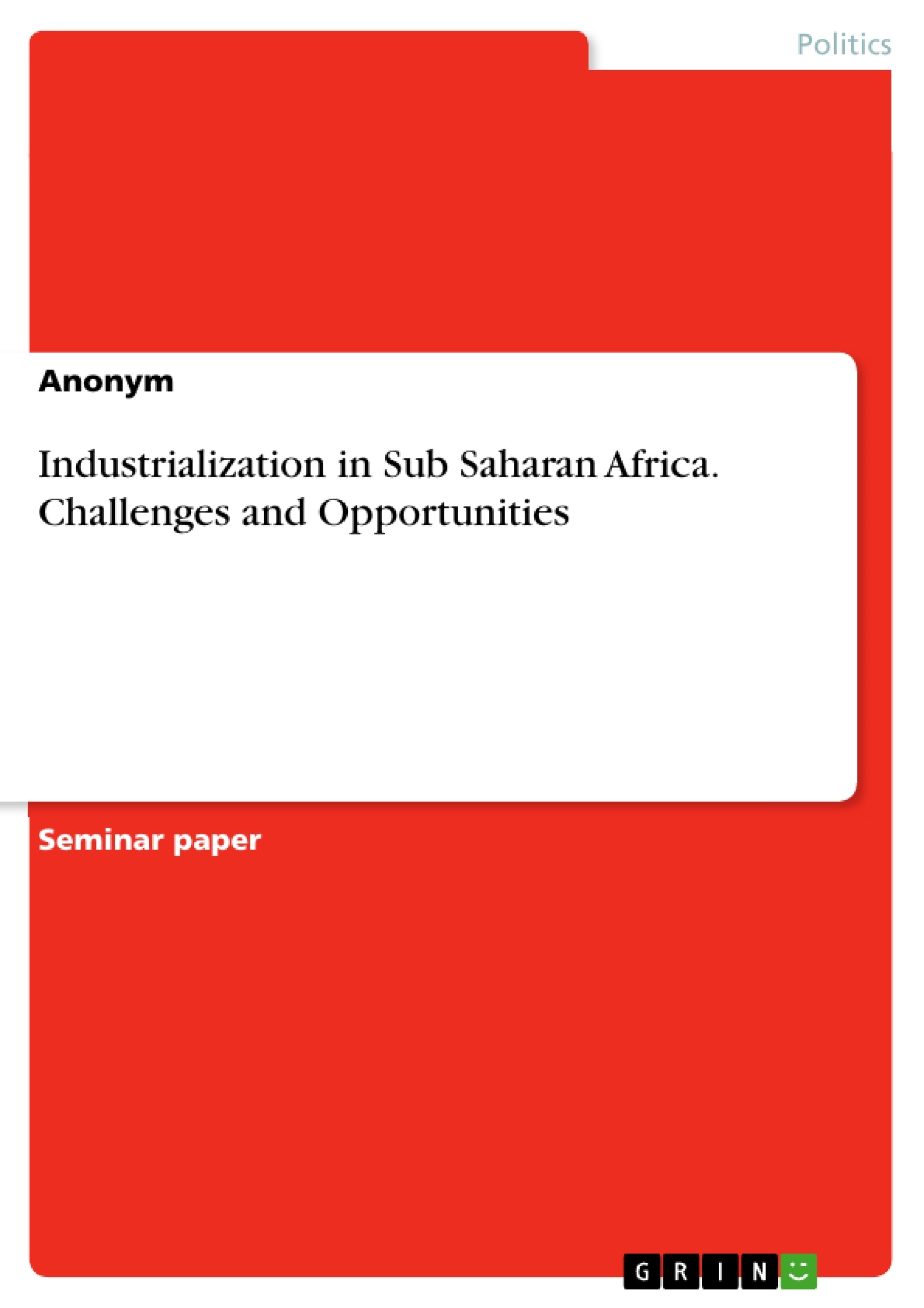The main question that is supposed to be answered in this paper is: does Africa need Industrial policy for (sustainable) economic development? How are these policies supposed to look like and what are the preconditions to achieve them? To be able to find solutions for these interrelated questions, they have to be embedded in a broader context. First, a short introduction into the history of Africa’s economic development, with regard to (de)industrialization, is being given. To understand why industrial policy might be of importance, one also has to look into the relationship between structural transformation and the chances of economic growth.
This paper is aiming to give an overview about the reasons why Africa (mostly Sub-Saharan Africa) has missed industrialization, how structural transformation can lead to (sustainable) economic development and growth and which chances and challenges African countries face as late-industrializers in a world with high levels of globalization.
The first part is meant to give a short introduction into the economic development and (de-)industrialization of modern post-colonial Africa. This is important as the current economic situation can only be fully understood by looking at what has happened in the past. The second part is giving theoretical input about structural transformation and the role of industrial policies – discussing its scientific background of pros and cons.
Inhaltsverzeichnis (Table of Contents)
- Introduction
- Economic Development in Africa
- Growth and Structural Transformation
- Why Manufacturing?
- Past Industrialization Efforts
- Industrial Policies: Challenges and Opportunities
- Challenges
- Opportunities
- Policy Suggestions
- Conclusion
Zielsetzung und Themenschwerpunkte (Objectives and Key Themes)
This paper explores the question of whether industrial policy is crucial for achieving sustainable economic development in Africa, particularly Sub-Saharan Africa. It delves into the historical context of Africa's economic development, analyzing the reasons behind its limited industrialization success. The paper also examines the relationship between structural transformation and economic growth and investigates the challenges and opportunities faced by African countries as late-industrializers in a globalized world.
- The role of industrial policy in achieving sustainable economic development in Africa.
- The historical context of Africa's economic development and its limited industrialization success.
- The relationship between structural transformation and economic growth.
- Challenges and opportunities faced by African countries as late-industrializers in a globalized world.
- Exploring alternative development paths for Africa beyond traditional models of industrialization.
Zusammenfassung der Kapitel (Chapter Summaries)
The first chapter provides an overview of the economic development and (de-)industrialization of post-colonial Africa, emphasizing the importance of understanding the past to comprehend the current economic situation. The second chapter delves into the theoretical framework of structural transformation, discussing the roles of industrial policies, neo-classical economics, and development economics in promoting economic growth.
The third chapter examines the specific challenges and opportunities presented by industrial policies in Africa. This section investigates the potential of industrial policies to drive sustainable economic development while acknowledging the complexities and obstacles African countries face in implementing effective policies.
Schlüsselwörter (Keywords)
The paper focuses on the key themes of industrialization, structural transformation, economic development, industrial policy, and the challenges and opportunities facing Sub-Saharan Africa in its pursuit of sustainable growth. The analysis draws upon research findings and economic theories to provide a comprehensive understanding of the complex dynamics at play in Africa's industrialization journey.
Frequently Asked Questions
Does Africa need industrial policy for economic development?
The paper argues that industrial policy is crucial for sustainable economic development and growth, particularly in Sub-Saharan Africa.
Why has Africa missed out on industrialization in the past?
The study explores the historical context of post-colonial Africa, analyzing past efforts and the reasons why structural transformation has been limited.
What is the role of manufacturing in economic growth?
Manufacturing is seen as a key driver for structural transformation, which leads to higher productivity and more sustainable development paths.
What are the challenges for "late-industrializers" in Africa?
African countries face high levels of globalization and competition, making it harder to follow traditional industrialization models used by earlier nations.
What are the preconditions for successful industrial policies?
The paper discusses necessary preconditions and provides policy suggestions on how these frameworks should look to achieve economic growth.
- Citation du texte
- Anonym (Auteur), 2018, Industrialization in Sub Saharan Africa. Challenges and Opportunities, Munich, GRIN Verlag, https://www.grin.com/document/449115



